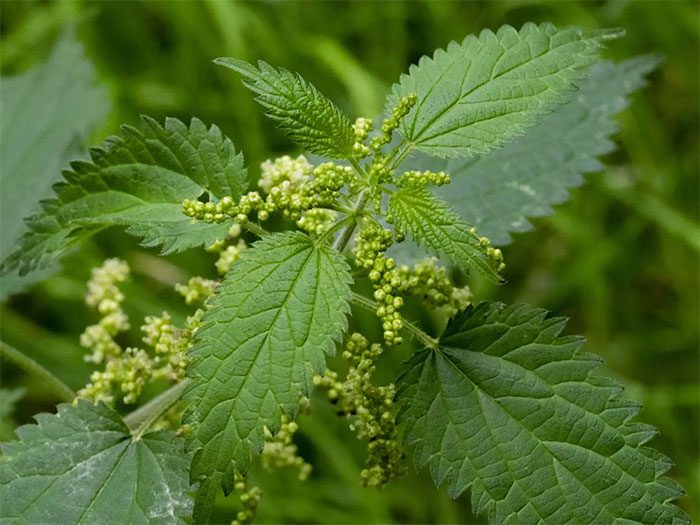Most people suffering from rhinitis often use over-the-counter (OTC) antihistamines or prescription medications to treat seasonal allergies. However, there are several natural antihistamines that can help alleviate symptoms such as sneezing, itching, runny nose, or scratchy throat caused by allergic rhinitis.
Top 6 Natural Antihistamines for Allergic Rhinitis
Histamine causes seasonal allergies by inducing inflammation in the sinuses and nasal passages. This leads to blood vessel dilation and leakage of fluid into the surrounding tissues. Allergic rhinitis also makes the swollen tissues overly sensitive. These combined effects result in symptoms such as sneezing, runny nose, nasal congestion, or post-nasal drip. Antihistamines work by blocking the effects of histamine.
There are several natural substances that contain compounds classified as antihistamines. While many of these are still undergoing further research, early studies have shown the potential of these natural antihistamines.
It is important to discuss any new treatments with your doctor.
1. Nettle
Nettle has been widely used both orally and topically to support the treatment of allergic rhinitis as a natural antihistamine.
While evidence supporting this is limited, according to Very Well Health, a 2017 study involving 37 individuals with seasonal allergic rhinitis who supplemented with nettle daily for a month compared to 37 others using a placebo showed that while nettle did not significantly outperform the placebo, it was safe, well-tolerated, and did not cause any notable side effects.

Nettle. (Image: Internet).
Nettle can be consumed in various forms such as tea, supplements, etc. Possible side effects include stomach discomfort, water retention, sweating, and diarrhea.
2. Vitamin C for Inflammation Reduction
Vitamin C is renowned for its ability to reduce the severity of colds and shorten the duration of illness (albeit slightly) due to its powerful anti-inflammatory and antioxidant properties. A 2021 study published on MDPI indicated that inflammation is a major cause of allergic reactions, and scientists believe that reducing inflammation can help alleviate symptoms.
This was also noted in a 2018 study published in the Journal of International Medical Research. In this study, researchers administered high doses of intravenous vitamin C (7.5 grams) to 71 adults with skin and respiratory allergies. Results showed a mild reduction in allergy symptoms among this group.

Fruits rich in Vitamin C. (Image: Internet)
However, this does not mean that taking 7,500 milligrams of vitamin C at once will yield similar effects. More research is needed to draw conclusions. Moreover, vitamin C should not be supplemented in excess of 2,000 milligrams per day, as excessive vitamin C can lead to side effects such as nausea, stomach discomfort, cramps, and diarrhea. At high doses, vitamin C may also interfere with the absorption of other essential vitamins and minerals.
You can take vitamin C in supplement form (gradually increasing the dose) or, preferably, from natural sources rich in vitamin C such as red bell peppers, kiwis, broccoli, strawberries, etc.
3. Quercetin
Quercetin is an antioxidant found in many plants and is evaluated for its potential effects in treating allergic rhinitis due to its ability to block the pathways that release histamine into the bloodstream.
A study conducted in 2022 with 66 seasonal allergy sufferers – half of whom supplemented with 200 milligrams of quercetin while the other half received a placebo – showed that symptoms such as itchy eyes, sneezing, and runny nose decreased after four weeks of use.

Quercetin is an antioxidant. (Image: Internet)
Quercetin is available as a supplement or found in various foods rich in quercetin such as dill, onions, oregano, peppers, cranberries, spinach, kale, lettuce, asparagus, cherries, etc.
Possible side effects of quercetin include headaches or stomach discomfort. If you have kidney disease or are pregnant or breastfeeding while experiencing allergic rhinitis, you should avoid quercetin supplementation.
4. Butterbur
Butterbur, scientifically known as Petasites hybridus, has been used in medicine for a long time to support the treatment of symptoms related to the urinary tract, stomach pain, headaches, allergic rhinitis, and other health conditions.
For allergic rhinitis, butterbur has anti-inflammatory effects similar to vitamin C, thus alleviating symptoms caused by allergic rhinitis.

Image of Butterbur. (Image: Internet).
A 2021 study published in the journal Pharmaceuticals reported that butterbur extract used for up to 8 weeks could significantly and durably reduce seasonal allergy symptoms. However, this finding was limited by the fact that 41.5% of participants were also taking other allergy medications.
Butterbur can be taken in supplement form, extract, or dry form. Possible side effects may include burping, headaches, itchy eyes, diarrhea, and difficulty breathing.
5. Bromelain
Bromelain is a popular natural remedy for treating swelling or inflammation, particularly in the sinuses and following injury or surgery. Studies on mice have shown that bromelain may reduce allergy sensitivity and respiratory allergies due to its anti-inflammatory and anti-allergic properties.

Bromelain in pineapple is mainly found in the stem and core. (Image: Internet).
However, there is still no research demonstrating whether high concentrations of bromelain provide actual benefits in reducing sneezing, runny nose, nasal congestion, or post-nasal drip.
You can find bromelain in supplement form; it is primarily found in the stem and core of pineapple. Possible side effects when supplementing with bromelain include stomach discomfort, diarrhea, and interaction with some antibiotics like amoxicillin.
6. Probiotics
Probiotics are live bacteria and yeasts that naturally reside in your gut, believed to benefit your digestive and immune health. Recent studies suggest that they may even help treat allergies.
A 2022 review of studies published in Frontiers of Immunology indicated that based on the evaluation of 28 human trials, probiotics significantly reduced symptoms and improved the quality of life in adults and children with allergic rhinitis.
It is hypothesized that the normal balance of microorganisms in the digestive tract (known as the gut microbiome) plays a central role in immune responses. Conversely, an imbalance in these microorganisms may lead to abnormal immune responses and the development of immune disorders such as allergies.

Fermented milk containing probiotics. (Image: Internet).
By restoring balance to the gut microbiome, probiotics may soothe reactions caused by allergic rhinitis.
However, not all probiotics are created equal. Among the many different types of probiotics used in supplements, some can produce histamine. These include Lactobacillus casei, Lactobacillus bulgaricus, and Lactobacillus saerimneri. The use of these bacteria may provoke reactions in individuals highly sensitive to histamine.
You can supplement probiotics through dietary supplements or fermented foods like yogurt, kombucha, sauerkraut, kimchi, etc.
Note that natural products can cause side effects and negative drug interactions, so it is essential to consult with a doctor before using any natural antihistamines, especially if you have other underlying health conditions.
In addition to the natural antihistamine remedies mentioned above, you can also alleviate and soothe the symptoms of allergic rhinitis by using a specialized nasal rinse, adding honey to tea or food to reduce respiratory inflammation, and making it easier to breathe, among other methods.



















































